-
 ITFA represents the rights and interests of banks, financial institutions and service providers involved in trade risk and asset origination and distribution.Our Mission
ITFA represents the rights and interests of banks, financial institutions and service providers involved in trade risk and asset origination and distribution.Our Mission
Published by PANGEA-RISK on 2nd June 2023
Incumbent Recep Tayyip Erdoğan secured a third term as Türkiye’s president on 28 May after defeating his challenger Kemal Kılıçdaroğlu in a historic run-off race. The completion of the 2023 Turkish election process eases some concerns over Türkiye’s political stability but raises fresh questions about the country’s future policies. A re-elected government will likely stay the course on most domestic and foreign policies but could moderate some of its economic policies as Erdoğan looks to cement his legacy.
President Recep Tayyip Erdoğan has won five more years in power following a tight run-off election on 28 May. Erdoğan pulled in 52.2 percent of the vote, while opposition candidate Kemal Kılıçdaroğlu received 47.8 percent. On 30 May, the Supreme Election Council also confirmed that Erdoğan’s Justice and Development Party (AKP)-led “People’s Alliance” will maintain control of Türkiye’s parliament after winning the most seats in the 14 May legislative election. Despite the ruling coalition’s majority in parliament, it falls short of the required majority to unilaterally draft a new constitution or make constitutional amendments. Both the new parliament and Erdoğan will begin their fresh mandates on 2 June.
In a speech on 30 May, Erdoğan promised to continue many of his ”successful” policies, ”seek solutions” to economic problems, and improve Türkiye’s diplomatic ties with its regional neighbours and Western allies. However, the outlook on economic policy in Türkiye post-election remains uncertain. While there are hopes for potential shifts and a more orthodox approach, concerns about centralised decision-making, institutional capacity, and the lack of clear signals from President Erdoğan have tempered expectations. The implementation of effective economic reforms and the appointment of key figures in the finance and economy portfolios will be closely monitored by domestic and international stakeholders to assess the trajectory of Türkiye’s economic policies in the coming years. The president is also likely to continue an assertive foreign policy that has seen him come into confrontation with both the European Union (EU) and the United States (US).
PANGEA-RISK analyses the election results in Türkiye, examining their impact on the country’s political system, foreign policy direction, and economic outlook.
Election results
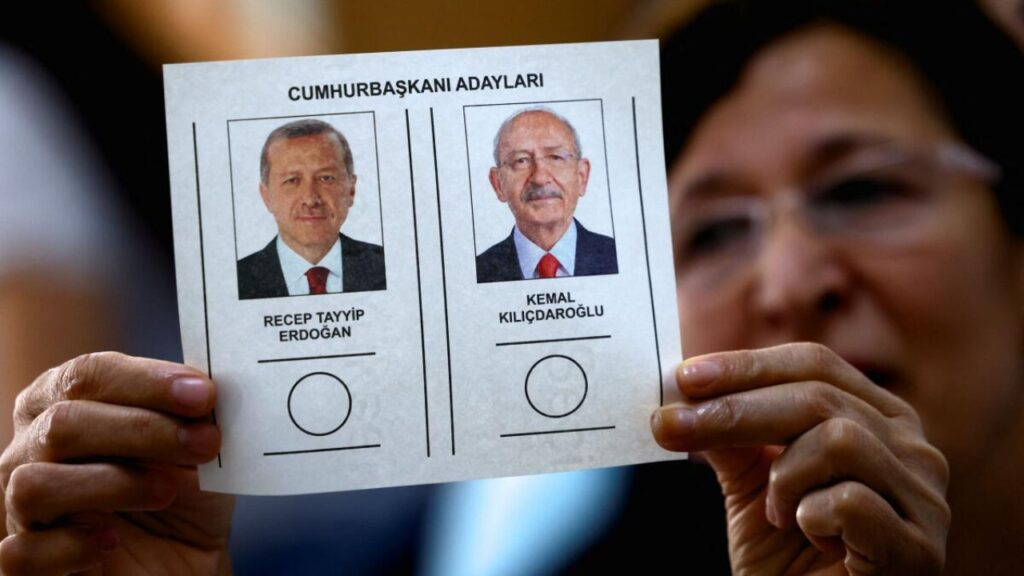
On 14 May 2023, 64.1 million eligible voters in Türkiye, plus 1.9 million eligible citizens abroad, went to the ballot box to elect the president and members of the parliament for the next five-year term. The voter turn-out rate was an impressive 87 percent, much higher than in many established democracies elsewhere. As predicted by Pangea-Risk, Kılıçdaroğlu only gained 44.9 percent of the votes against 49.5 percent for Erdoğan, the difference of which equates to roughly 2.5 million votes. In the second round, there was an 84.5 percent turnout rate, lower than in the first round. Erdoğan won a clear majority with 52.1 percent of votes against 47.9 percent for Kılıçdaroğlu.
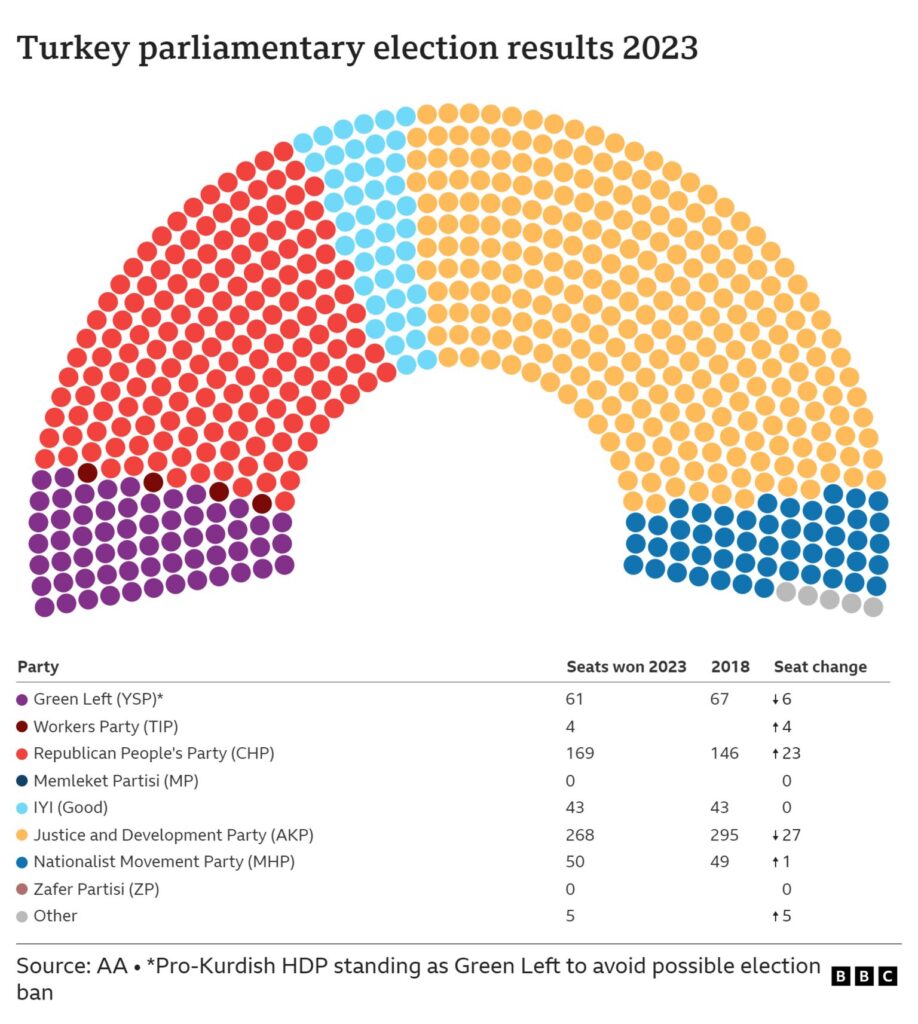
In the parliamentary elections, which ran alongside the presidential elections, Erdoğan’s AKP party received 35.6 percent of the votes. While this was the biggest share of votes of any party, it also represented a loss of around 6.9 percentage points compared to the 2018 election. Meanwhile, the left-wing Republican People’s Party (CHP) won 25.3 percent of the vote (an increase of around 2.7 percentage points compared to 2018) and the Party of Greens and the Left Future (YSP) entered parliament for the first time with 8.8 percent. This meant, against prevalent expectations, that the AKP and its coalition partners in the People’s Alliance won the absolute majority with 323 seats in parliament out of 600, while supporters of the opposing “Nation’s Alliance” won only 277 seats.
While the ruling coalition won an absolute majority neither side was able to achieve the overwhelming majority needed to unilaterally draft a new constitution or make constitutional amendments, neither directly through parliament (a two-thirds majority) nor even by submitting the matter to a popular referendum (60 percent). This means that any amendments regarding the presidential system or activating the idea of drafting a civil constitution for the country will be contingent on reaching a consensus between the two sides. The opposition coalition has become less homogeneous with the entry of religiously conservative parties into the lists of the CHP, and they will likely be closer to the AKP and its parliamentary coalition’s agenda regarding issues of religious or cultural significance. Hence, the election results have settled the debate about the country’s political system. The failure of the opposition to obtain a majority in parliament means that any attempts to bring back the parliamentary system will be postponed until at least the next elections.
Apart from Kılıçdaroğlu’s and the opposition’s underperformance, the other outcome was the phenomenal rise of nationalist votes. The candidate of the far-right Turkish nationalist camp, Sinan Oğan, scored 5.2 percent of the votes on his first appearance on the political scene. The fourth candidate, Muammer İnce, dropped out of the race three days before the election, citing a defamation campaign against his dignity as the reason. Since no candidate passed the 50 percent threshold in the first round, elections went to a run-off on 28 May 2023. The results sent also sent shockwaves across the opposition, so former internal disputes will likely resurface. Kılıçdaroğlu will inevitably come under fire in his own party for choosing the wrong allies and for insisting on his candidacy. He is unlikely to maintain his party leadership through the next presidential election. The opposition alliance he also led could collapse before it remerges in some other form.
Conservative trends grow
Results of the May 2023 elections indicate that the ruling party’s decrease in votes does not reflect a decline in the popularity of the conservative base, consisting of religious and nationalist voters with varying orientations. While the AKP experienced a loss in voter support, the Nationalist Movement Party (MHP), a participant in the ruling coalition, defied expectations and maintained its electoral base nearly intact. Furthermore, there was an increase in votes for Islamic and nationalist parties that exceeded the ruling party’s losses. Notably, the New Welfare Party (Islamic) and the Victory Party (extreme nationalist) gained new votes, and the presidential candidate Oğan received a significant number of votes, indicating the consolidation of an influential base supporting right-wing politics.
Even the CHP, representing Atatürk’s left, gained new votes that did not solely come from its traditional base. A significant percentage of these votes originated from the conservative base supporting the Good Party, Democracy and Progress Party, as well as the Future Party, whose candidates were included on the CHP’s lists. As the major parties are no longer able to achieve a majority on their own, including AKP, small parties are gaining greater importance in the Turkish political scene. Accordingly, there is more diversity in the parliament with the presence of representatives from 15 political parties, with candidates from several small parties on the lists of the two major parties winning seats.
The growing strength of nationalist currents in the country in various alliances will also play a crucial role in shaping Turkish foreign policy. If President Erdoğan’s government is required to consolidate policies catering to the preferences of this conservative base, it implies advancing plans such as the repatriation of Syrian refugees, including normalisation with the President Bashar Al Assad regime, and maintaining firm positions on foreign issues like the Eastern Mediterranean and confronting Western pressures in general. Additionally, it entails progressing with domestic defence industry projects, which have become a source of national pride.
Turkish Soldiers Parade
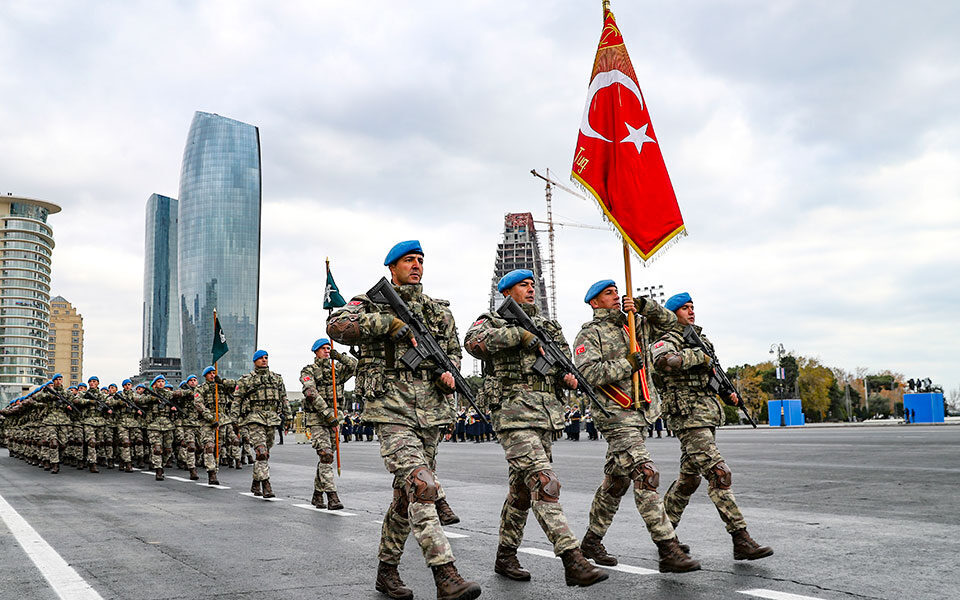
Implications for foreign policy
Türkiye’s foreign policy is not expected to make a U-turn, and continuity will likely prevail over radical change. However, the continuation of Erdoğan’s rule and growth in nationalist trends will strengthen the notion of a “strong Türkiye” in foreign policy. Erdoğan will aim to establish a balanced foreign approach where Türkiye remains an active NATO member but independent of Western influence without outright hostility towards it. Reviving Türkiye’s membership talks with the EU appears a distant prospect. Consequently, concerns will persist among certain Western powers who perceive Türkiye’s ascent as encroaching on Western influence in various regions, including the Balkans, Southern Europe, the Mediterranean, North Africa, as well as the African continent and the Middle East.
Despite Western congratulatory messages to Erdoğan, his victory surely disappoints US and European officials hoping that the election would produce a government more closely aligned with Western policy toward Russian President Vladimir Putin and the invasion of Ukraine. As such, it is likely that Türkiye’s relationship with the West, under Erdoğan’s rule, will continue to experience periodic tensions. Simultaneously, Erdoğan’s firm domestic position will compel Western powers to pragmatically engage with Türkiye to serve their vital interests. Furthermore, the anticipated focus of the new Turkish government on improving the economy will incline Türkiye towards containing external hostilities in general.
Türkiye’s Geopolitical Sphere
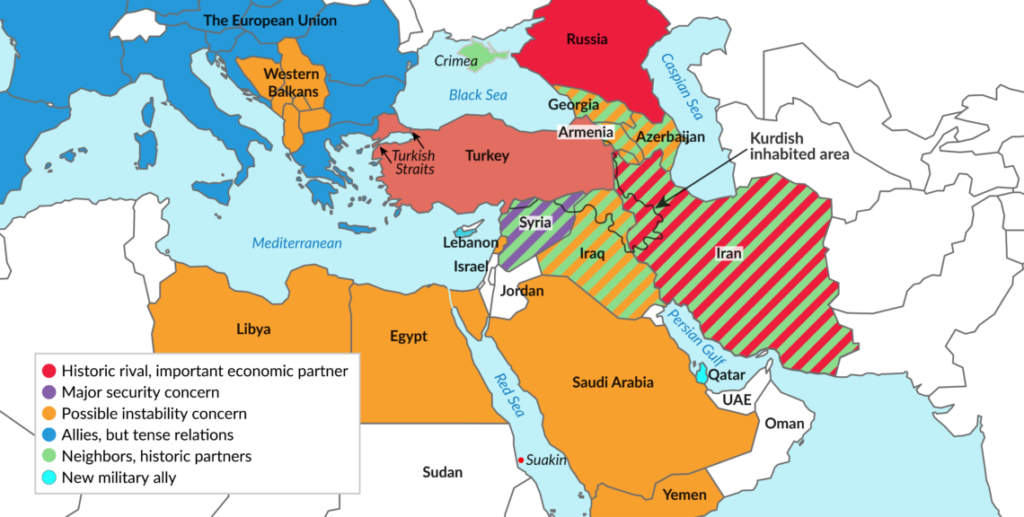
Despite Türkiye’s growing influence, which also competes with Russian influence in the Black Sea, the Caucasus, and Central Asia, Russia still perceives benefits in maintaining a friendship with Türkiye due to the Western isolation imposed on Russia by the US and the EU due to the Ukraine war. Hence, Russian President Vladimir Putin did not hesitate to welcome the achievements of the Erdoğan government days before the elections, also evidenced by his participation in the inauguration of the “Akkuyu” nuclear power plant in Türkiye in April 2023. Regarding China, Erdoğan has reduced criticism of China’s treatment of the Uyghur community and expressed interest in Türkiye joining the Shanghai Cooperation Organisation led by Russia and China. Despite China’s caution, he may push for closer ties with the East.
Regionally, the election results are likely to provide momentum to Türkiye’s policy towards the Middle East, to strengthen cooperation and mitigate conflicts. This becomes particularly significant as the Gulf states gain growing importance in Türkiye’s regional calculations, serving as a vital source of investments and a crucial market for Turkish private and military enterprises. As a result, the Gulf states are anticipated to display increased eagerness in bolstering economic and military relations, now that the elections have affirmed Erdoğan as Türkiye’s strong leader. Furthermore, we may witness expedited progress in the path towards normalisation with Egypt, which may have been paused in recent months, awaiting the outcome of the elections.
Economic policy outlook
Following President Erdoğan’s victory in the recent election, the outlook on economic policy in Türkiye has garnered significant attention and raised questions about the potential changes that lie ahead. The country’s economic challenges, including inflationary pressures and a depreciating currency, have deterred foreign investors in recent years. The lira has plunged to record lows after the election, weakening to 20.10 per dollar, losing over 3 percent of its value since then. As a result, there is a growing consensus that economic reforms and policy adjustments are necessary to stabilise the fiscal budget, strengthen the financial sector, and regain investor confidence.
Turkey – Inflation Rate
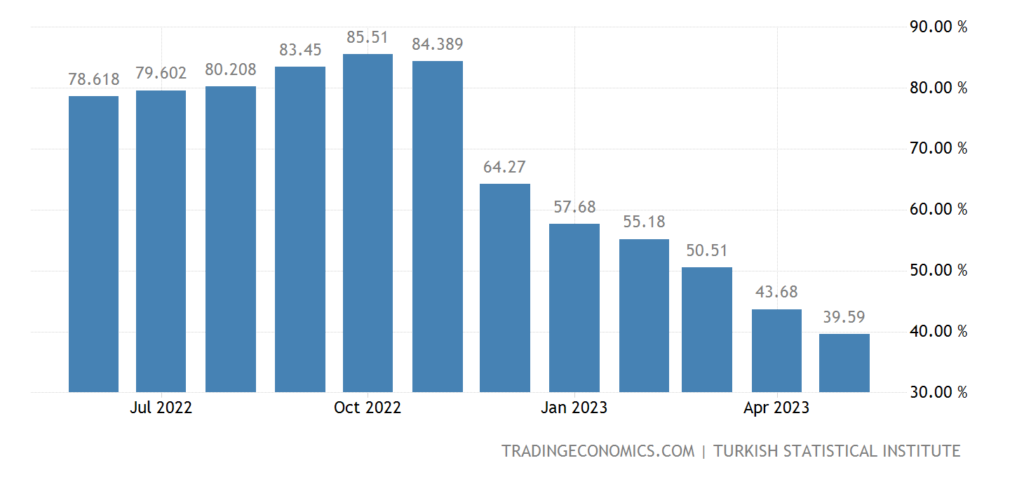
Turkey – Full Year GDP Growth
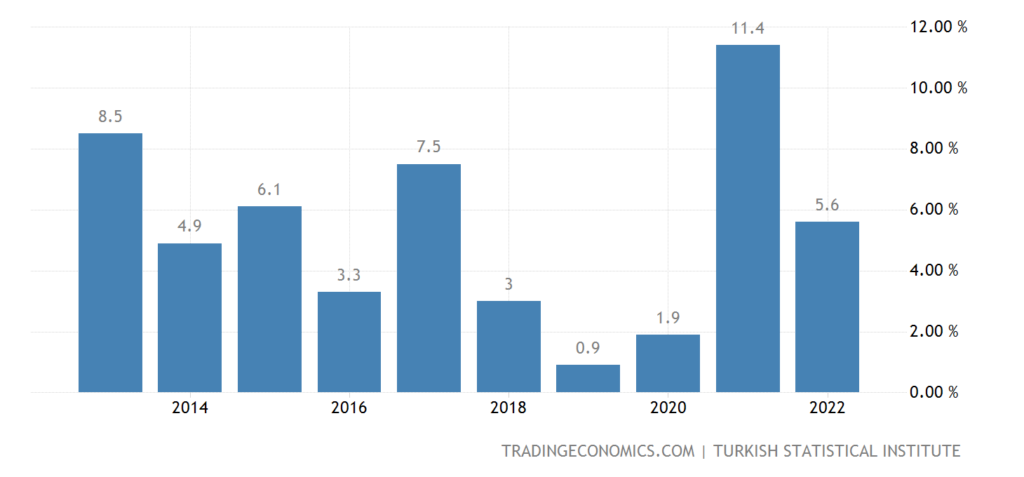
Turkey – Current Account to GDP
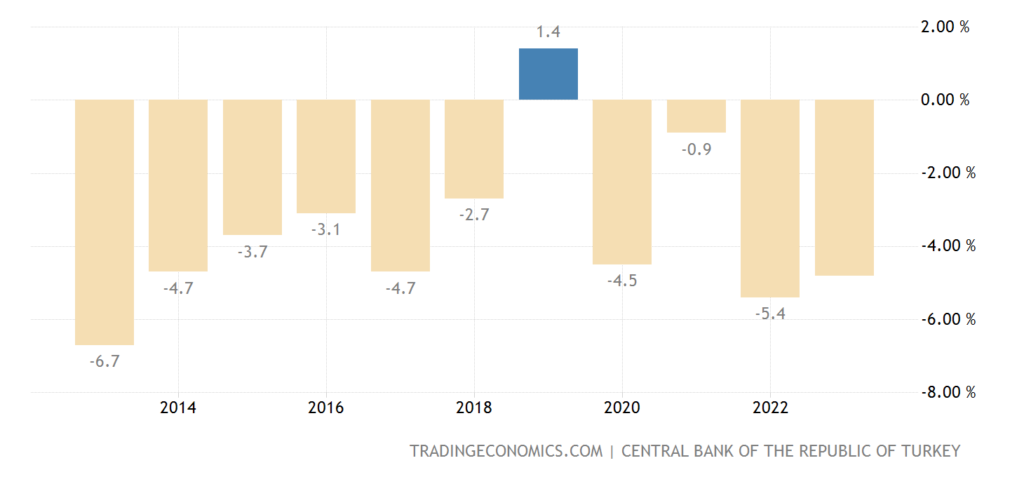
The anticipated cabinet reshuffle, which may include changes in the finance and economy portfolios, as well as the leadership of the central bank, is widely expected. This has led to speculation about the direction of economic policy under the new administration. The market is closely watching for signals that indicate a decisive shift in policymaking, especially in an environment characterised by unorthodox economic policies. There have been reported discussions among ruling party members about adopting a new policy stance, including gradual interest rate hikes and a targeted lending program. The final decision on the finance minister position is expected to provide strong signals about the economic policies in the coming weeks. The possible appointment of former Finance Minister Mehmet Şimşek or a similar figure could reinforce expectations for a swift return to more orthodox economic policies.
However, concerns remain regarding the institutional capacity of key economic and monetary policy institutions. Erdoğan’s past actions, which side-lined technocrats and led to frequent personnel changes, have raised doubts about the influence of sensible voices in decision-making processes. The revolving door at the central bank and the hollowing out of institutional capacity have left lasting negative effects on the economy. Additionally, President Erdoğan has not provided clear indications of the specific direction of economic policy in the near future. While he acknowledged the issues facing the country, such as inflation and declining growth, his speech after the election emphasised the need for relief without outlining a detailed roadmap. This lack of clarity has contributed to uncertainty regarding the direction of economic policy. The possibility of a partial adjustment of the policy mix still exists, but it will require a well-defined and transparent approach to regain confidence and stability in the economy.
COUNTRY OUTLOOK
President Recep Tayyip Erdoğan extended his 20-year tenure in power at the May 2023 elections. The ruling coalition, led by Erdoğan’s Justice and Development Party (AKP), also obtained a parliamentary majority but lacked the required numbers for unilateral constitutional changes. The rise of conservative and nationalist trends will likely shape Türkiye’s domestic and foreign policies. With Erdoğan’s centralised decision-making, both foreign and economic policy outcomes remain uncertain, resulting in subdued investor interest. Türkiye’s involvement in regional conflicts and strained relations with the West contribute to the challenging geopolitical landscape. Unconventional economic policies and assertive foreign approaches have further weakened investor confidence, leading to a depreciated lira. Additionally, Türkiye faces significant external financing requirements, and its private sector carries substantial foreign currency debt, posing risks to financial stability. These factors highlight the complexities and potential challenges that lie ahead for Türkiye over the coming year.
Privacy Policy | Cookie Policy
Designed and produced by dna.studio